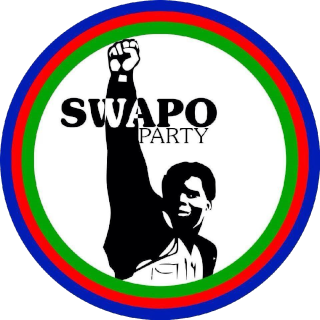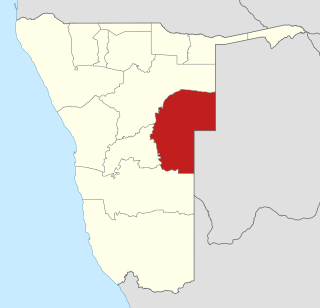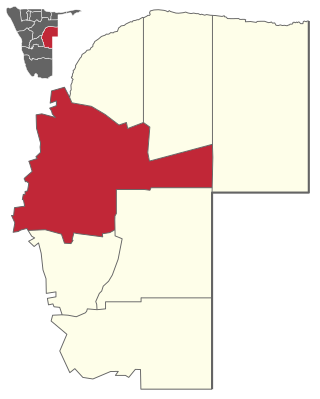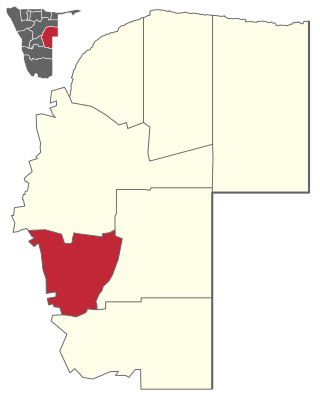Related Research Articles

Politics of Namibia takes place in a framework of a semi-presidential representative democratic republic, whereby the President of Namibia is both head of state and head of government, and of a pluriform multi-party system. Executive power is exercised by both the president and the government. Legislative power is vested in the two chambers of Parliament. The judiciary is independent of the executive and the legislature.

The South West Africa People's Organisation, officially known as the SWAPO Party of Namibia, is a political party and former independence movement in Namibia. Founded in 1960, it has been the governing party in Namibia since the country achieved independence in 1990. The party continues to be dominated in number and influence by the Ovambo ethnic group.

Otjozondjupa is one of the fourteen regions of Namibia. Its capital is Otjiwarongo. The region further contains the municipalities of Okahandja and Grootfontein and the towns Okakarara and Otavi. As of 2020, Otjozondjupa had 97,945 registered voters.

Omaheke is one of the fourteen regions of Namibia, the least populous region. Its capital is Gobabis. It lies in eastern Namibia on the border with Botswana and is the western extension of the Kalahari desert. The self-governed villages of Otjinene, Leonardville and Witvlei are situated in the region. As of 2020, Omaheke had 48,594 registered voters.

Gobabis is a town in eastern Namibia. It is the regional capital of the Omaheke Region, and the district capital of the Gobabis electoral constituency. Gobabis is situated 200 km (120 mi) down the B6 motorway from Windhoek to Botswana. The town is 113 km (70 mi) from the Buitepos border post with Botswana, and serves as an important link to South Africa on the tarred Trans-Kalahari Highway. Gobabis is in the heart of the cattle farming area. In fact Gobabis is so proud of its cattle farming that a statue of a large Brahman bull with the inscription "Cattle Country" greets visitors to the town. Gobabis also has its own local airport.

Khomasdal Constituency is a constituency in Windhoek in the Khomas Region of Namibia. As of December 2019 it had 25,550 registered voters. The constituency consists of parts of the suburbs Khomasdal, Katutura, and Otjomuise. It had a population of 43,921 in 2011, up from 27,950 in 2001.
Asser Kuveri Kapere is a Namibian politician. He is a member of SWAPO and was the Chairman of the National Council of Namibia from December 2004 to December 2015.

Bernhardt Martin Esau is a Namibian politician. A member of the South West Africa People's Organization (SWAPO), Esau has been a member of the National Assembly since being nominated by President Sam Nujoma and subsequently elected in the 1994 Namibian general election.

Kalahari Constituency is an electoral constituency in the Omaheke Region of eastern central Namibia. It had 9,234 inhabitants in 2004 and 5,294 registered voters in 2020. The constituency covers the rural area east of Gobabis as well as Gobabis' Nossobville suburb. The constituency office has been inaugurated in 2009 and is located at the Ben-Hur settlement. Kalahari constituency forms part of the border between Namibia and Botswana.

Ndiyona is a constituency in the Kavango East region of Namibia. The district centre is the settlement of Ndiyona. It had a population of 20,633 in 2011, up from 19,565 in 2001. As of 2020 the constituency had 6,210 registered voters.

Aminuis Constituency is an electoral constituency in the Omaheke Region of Namibia. It had 12,343 inhabitants in 2004 and 7,847 registered voters in 2020. The district capital is the settlement of Aminuis. The constituency forms part of the border between Namibia and Botswana.

Okorukambe Constituency, until 2013 Steinhausen Constituency, is an electoral constituency in the Omaheke Region of Namibia. It had 9,066 inhabitants in 2004 and 5,818 registered voters in 2020. Its district capital is the settlement of Steinhausen. It further contains the settlements of Witvlei and Omitara.

Gobabis Constituency is an electoral constituency in the Omaheke Region of Namibia. As of December 2019 it had 13,457 registered voters. The constituency covers the rural area southeast of Gobabis and the town itself, except its eastern Nossobville suburb which belongs to Kalahari Constituency. Gobabis is also the seat of the constituency office.

Okatyali Constituency is an electoral constituency in the Oshana Region of Namibia. It had 2,815 inhabitants in 2004 and 2,051 registered voters in 2020. Its district capital is the settlement of Okatyali.
Paulus Kapia is a Namibian politician. A member of SWAPO, Kapia was first elected to the National Assembly of Namibia in 2005. He was appointed to the politburo of SWAPO and served for a short time as Deputy Minister of Works, Transport and Communication but was forced to resign in August 2005 after being implicated in a corruption case. After SWAPO suspended all his party activities in the wake of the scandal, Kapia also lost his seats in the politburo and as member of parliament. He was, however, reinstated "on humanitarian grounds" into his SWAPO Party Youth League job in 2016.

The Cabinet of Namibia is an appointed body that was established by Chapter 6 of the Constitution of Namibia. It is mandated to include the following positions: the President of Namibia, the Prime Minister of Namibia and any positions that the President so appoints.

Moses ǁGaroëb Constituency is an electoral constituency in Windhoek, the capital of Namibia. It had a population of 45,564 in 2011, up from 25,642 in 2001. As of 2020 it had 41,550 registered voters.

Rundu Urban is an electoral constituency in the Kavango East region of Namibia. It covers the urban area of Rundu, the region's capital and one of Namibia's largest cities. The constituency also covers parts of the Sauyemwa, Safari, Tutungeni, Katutura, Donkerhoek and Kehemu neighborhoods. It had a population of 20,953 in 2011, up from 19,173 in 2001. As of 2020 the constituency had 35,740 registered voters.

Epukiro is a cluster of small settlements in the remote eastern part of the Omaheke Region of Namibia, situated about 120 kilometres (75 mi) northeast of the regional capital Gobabis. The centre of the populated area is the Catholic mission station. Epukiro had about 3,200 inhabitants in 1997, predominantly ethnic Tswana.

Aminuis is a cluster of small settlements in the remote eastern part of the Omaheke Region of Namibia, located about 500 km east of Windhoek. It is the district capital of the Aminuis electoral constituency.
References
- 1 2 3 Steve Mogotsi Archived 2011-06-11 at the Wayback Machine at Namibia Institute for Democracy
- ↑ "Electoral Act, 1992: Notification of Result of General Election for Regional Councils" (pdf). Government Gazette of the Republic of Namibia. No. 3366. Government of Namibia. 3 January 2005. p. 17.
- ↑ "Stefanus Mogotsi nimmt Kapias Stelle ein" [Stefanus Mogotsi takes Kapia's position]. Allgemeine Zeitung (in German). 24 October 2005.[ dead link ]